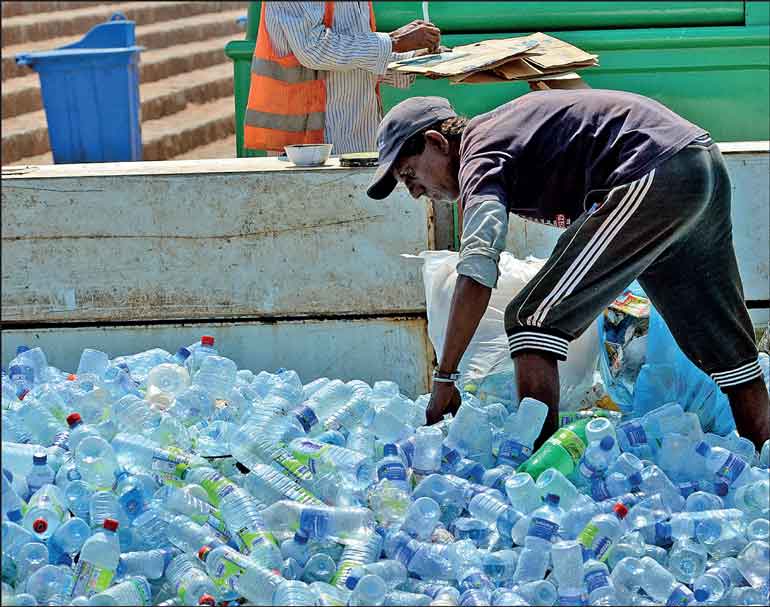Sunday Feb 22, 2026
Sunday Feb 22, 2026
Thursday, 16 December 2021 00:00 - - {{hitsCtrl.values.hits}}

Sri Lanka stands to gain in saving both foreign exchange and conserving the environment by making concerted efforts to improve and expand plastic recycling, commencing with relatively low-hanging fruits such as PET plastics – Pic by Shehan Gunasekara
 Recently, Sri Lanka’s environmental issues have seen an uptick due to circumstances, at times, beyond our control. Additionally, the irresponsible disposal of polythene and plastics have been an unending issue for the country; data shows that polythene and plastic comprise more than 5.9% of the country’s urban solid waste, which exceeds 400,000 kgs daily. Considering how vital the country’s natural assets are, it is abundantly clear that we must strive to improve our environmental and plastic waste management practices.
Recently, Sri Lanka’s environmental issues have seen an uptick due to circumstances, at times, beyond our control. Additionally, the irresponsible disposal of polythene and plastics have been an unending issue for the country; data shows that polythene and plastic comprise more than 5.9% of the country’s urban solid waste, which exceeds 400,000 kgs daily. Considering how vital the country’s natural assets are, it is abundantly clear that we must strive to improve our environmental and plastic waste management practices.
Most importantly, our country has made important strides to put forth a national policy, the National Action Plan on Plastic Waste Management 2021-2030, to responsibly manage the disposal of plastic waste by following the 3R concept – ‘Reduce, Reuse and Recycle’. Recycling, in particular, can play a far more significant role in mitigating this issue, provided that correct strategies are implemented. We must strengthen efforts relating to recycling and the circularity of plastics, particularly by targeting ‘low-hanging fruits,’ like polythene terephthalate (PET) plastics.
Such efforts will additionally have positive economic consequences as well. For the foreseeable future reducing unnecessary imports will be one of Sri Lanka’s most critical economic priorities. Imports of plastics stand out in this regard, considering that the country can drastically reduce these imports and save valuable foreign exchange through strengthening recycling.
PET plastics are valuable
While plastics are highly versatile and durable, they also take years to degrade. Hence, improper disposal of these can damage nature and wildlife. Certain plastics, such as micro-plastics, are also highly detrimental to human health when such particles contaminate food.
To avoid such issues, we should use plastics responsibly, and it should be reused and recycled wherever possible. PET plastics stand out in this regard because they are 100% recyclable. In addition, PET’s potential value addition is exceptionally high since our country possesses the necessary infrastructure for recycling and transforming it into value-added products. PET plastics are one of the most common types of plastics used to manufacture many products, including beverage/water bottles, packaging of food and personal care products such as hand sanitisers and hair oils.
In Sri Lanka, PET bottles are recycled to produce yarn for garments and bristles used in brushes and brooms by companies such as Eco Spindles Ltd. Hence, PET plastic waste is already being used to generate foreign exchange earnings for the country.
At present, according to statistics, while Sri Lanka’s monthly usage of PET bottles is estimated to be 1,250,000 kgs, only 250,000 kgs or 20% of this amount is recycled. This indicates that we are functioning far below the potential – in terms of recycling PET bottles.
Continuous improvements
To significantly improve the recycling of PET plastics, our country requires changes on multiple fronts; these include regulation, monitoring adherence to laws, awareness and design of products.
Sri Lanka has taken steps to ban a few single-use plastics items. These tend to be most harmful, since they’re not collectable and recyclable and differ significantly from plastic types such as PET, which are 100% recyclable. Hence, we need to further strengthen the relevant legal framework. Currently, we are working on introducing concepts such as Extended Producer Responsibility (EPR), which holds producers responsible for the treatment or disposal of products post-consumption.
At present, beverage giants globally demonstrate their commitment to recycling and ensuring that consumers are educated about proper recycling practices. Companies like Coca-Cola in Sri Lanka have voluntarily implemented programmes and impactful partnerships to recycle their PET plastic packaging. Such efforts need to be strengthened, and EPR should be considered a critical solution.
We also need to change our practices in line with global best practices in this sphere. For instance, Sri Lanka does not allow ‘bottle-to-bottle’ recycling in food-grade packaging, which means recycling an entire PET bottle to produce a new PET bottle. However, this is an accepted practice in many developed countries, allowed by even the Food and Drug Administration (FDA) of the United States.
We should consider the merit of such regulation while being mindful of health concerns since contaminated food packaging will be harmful to consumers. Perhaps the most feasible course of action is to first allow this for non-food grade packaging (such as dishwashing liquid bottles) and monitor the outcome.
In this context, our nation also needs to adopt comprehensive mechanisms for monitoring adherence to regulations. Even if the best standards and regulations are introduced, we must ensure implementation and commitment to these. At present, at the Central Environmental Authority (CEA), we are populating a database of island-wide waste collectors, with over 270+ collectors, to understand and monitor how much and what is collected.
Public cooperation and product design
Public awareness, commitment and proactive cooperation are critical. For instance, PET bottles are often used to store material such as kerosene and thereafter given for recycling. By this time, they are contaminated and cannot be reused. Thus, we must motivate and incentivise consumers to return PET bottles in good condition.
Furthermore, product design also plays a crucial role. For instance, if the aluminium foil/lid does not come off entirely in yoghurt cups, the cup cannot be recycled. While it is likely to be a long-term effort, we believe companies need to explore the feasibility of eco-friendly designs, either using degradable natural material for packaging or ensure high recyclability of packaging. However, this may also require a shift in the consumer’s mindset since it may require prioritising the environment over convenience.
We believe Sri Lanka stands to gain in saving both foreign exchange and conserving the environment by making concerted efforts to improve and expand plastic recycling, commencing with relatively low-hanging fruits such as PET plastics. To move forward, we require the support of the Government and the private sector to start the implementation of such policies, although it will require a long-term vision and initiatives. We also urge the general public to be responsible consumers and identify the platforms to dispose of your plastic waste, as it is critical to be part of the solution.
(The writer is Sarojinie Jayasekara is the Director of the Central Environmental Authority, Solid Waste Management.)